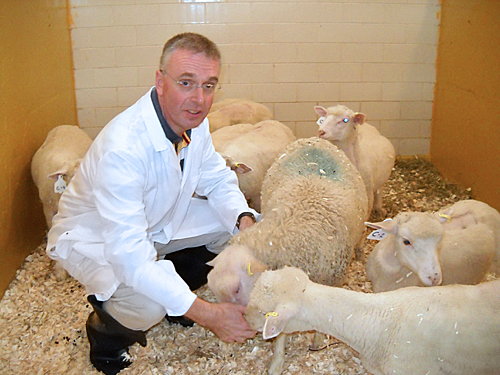
Sheep may graze more safely on organic farms without fear of succumbing to nasty ovine parasites, according to studies headed by pathobiology professor Andrew Peregrine.
Along with other researchers at Guelph and elsewhere, Peregrine has found that integrated farm management practices can help prevent and control roundworm infestation and help wean producers from treating flocks with conventional de-worming compounds.
Sheep may be infected ─ and even killed ─ by several kinds of gastrointestinal nematodes. Pertinent drugs are relatively cheap and have typically helped to maintain sheep production, but parasites are developing resistance to those drugs. That’s particularly a problem in large flocks in other countries, notably Australia, the United Kingdom and New Zealand. Peregrine says no one had looked at the problem in Canada.
Organic production relies less on drugs (de-wormers or anthelmintics) and more on preventing infection through grazing practices, improved nutrition and careful monitoring. But farmers need help with the shift to organic techniques, says the U of G researcher. One farm near Guelph went organic but lost so many lambs to parasites over several years that the farmer stopped raising sheep.
Peregrine’s team began studying roundworm infection in organic flocks in 2006. He’s working with population medicine professors Paula Menzies and David Kelton and PhD student America Mederos. Other collaborators have included researchers from the Organic Agriculture Centre of Canada, the Centre d’expertise en production ovine du Québec, the University of Prince Edward Island, and sheep producers in Ontario and Quebec.
Over three years, researchers paid monthly visits to 30 farms ─ both organic (certified and non-certified) and conventional ─ in southern Ontario and Quebec. They collected samples from animals and from pastures to track infection patterns in ewes and lambs year-round.
“You might assume that parasite egg counts would be higher on farms that did not use drugs to kill parasites. But we found that infection rates with parasites were typically lower on certified organic farms,” says Peregrine, a clinical parasitologist.
He suggests that producers practise integrated parasite management, including monitoring pasture and animals, paying attention to nutrition, genetics and pasture management, and using bioactive forages where possible. “Use of multiple control methods should increase the sustainability of parasite control on farms and reduce the need to use de-wormers,” he says.
Between 2006 and 2009, the project received about $500,000 in funding, mostly from government and industry. This year the research team has received another $400,000 to continue their studies. They plan to look at parasites’ winter survival, effects of lambing in fall or winter rather than traditional spring, and prevalence of resistance to de-wormers in Ontario sheep flocks.
Menzies says the most dangerous roundworm parasite is actually considered tropical, but scientists know little about its survival here. “Early findings suggest that it has adapted, making it potentially even more dangerous,” she says.